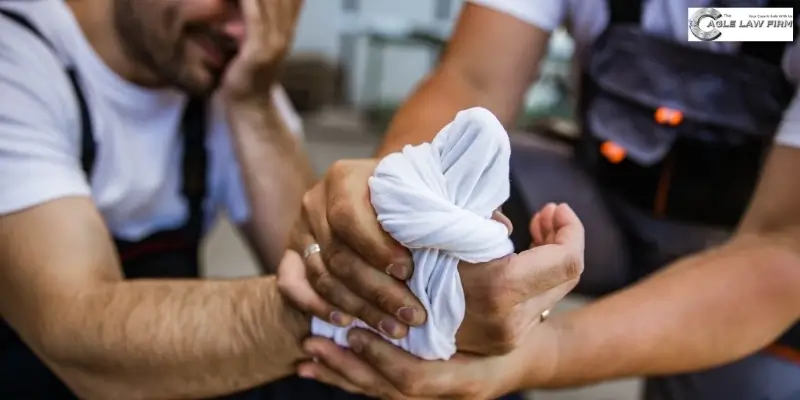St. Louis Soft Tissue Injury Lawyer
St. Louis Soft Tissue Injury Attorney
From simple scrapes and scratches to debilitating paralysis injuries, the number of ways a person can be hurt during a car accident is as large as it is varied. Among the most common car accident injuries are ones that affect the soft tissue, i.e., injuries to the body’s muscles, tendons, and ligaments. Damaged discs are also classified as “soft tissue” injuries, however, they can be far more painful than a broken bone and often may require surgery.
The term “soft tissue” makes the injury sound as if it is not serious. If you do not recover from a soft tissue injury in a few weeks, you absolutely must follow up with a doctor for further analysis. Oftentimes, you are simply evaluated in the ER for broken bones, bleeding, and life-threatening injuries. However, if pain continues, you will need to follow up to be sure that you have not injured a disc or joint that may require surgery.

Far from minor, soft tissue injuries are often excruciating and can require lengthy recovery times. Some may even necessitate physical therapy or surgery. Like any car accident injury, though, that’s just the half of it. Mental and emotional suffering can also result, not to mention lost wages, expensive medical bills, stressful transportation issues, and more. Generally speaking, injured people who get the appropriate medical care in a timely way have a better opportunity to have a better recovery. The best recovery possible is our goal as well as yours.
Fortunately, if you’ve been hurt in a car accident through no fault of your own, you may be entitled to compensation. The Cagle Law Firm’s soft tissue injury lawyers in St. Louis, MO, can help.
What Is the Difference Between a Strain and a Sprain?
Outside of contusions (bruises), the primary forms of soft tissue injury suffered during car accidents are often called “strains and sprains. While they share several similarities, these terms are not interchangeable, however, patients often use the terms interchangeably. Since it’s not uncommon for strains and sprains to be confused with one another, let’s explain the differences between each. Ultimately, whether your doctor diagnoses you with a strain or sprain, you must follow their medical advice and be certain to follow up with appropriate medical treatment if the pain does resolve in a couple of weeks.
Strains Affect Muscles & Tendons
The most significant difference between strains and sprains is what parts of the body they affect, with strains constituting an injury to muscles and tendons and sprains comprising injuries to the ligaments. Muscles are bands and bundles of fibrous protein filaments that contract to facilitate movement. Tendons, meanwhile, are the connective tissues that anchor muscles to bone. Unlike muscles, they tend to be stiff due to being composed of collagen and elastin. They also require a much smaller blood supply.
Strains occur when a muscle or tendon is stretched or twisted, such as by contortions resulting from the sudden impact and subsequent whiplash experienced during a car accident. Symptoms include pain, swelling, limited mobility and flexibility, and uncontrollable spasms.
Mild strains can usually be treated with rest, ice, compression, and elevation. More severe strains can tear the muscle or tendon itself, requiring physical therapy or even surgery to treat.
Sprains Affect the Ligaments
As noted above, while strains affect muscles and tendons, sprains affect ligaments. Like tendons, ligaments mainly serve as connective tissue, are made up of collagen and elastin, and require very little blood to function. Whereas tendons connect muscle to bone, ligaments are used to connect bones to other bones or cartilage, thus stabilizing and supporting joints.
Like strains, sprains suffered during car accidents are often caused by bodily contortions resulting from the sudden impact and whiplash. As a passenger’s body is jolted and thrown around during the collision, ligaments may be stretched, twisted, or even torn.
Because ligaments are incapable of contractions the way muscles are, spasms are fortunately not a symptom of sprains. Pain, swelling, and limited mobility and flexibility, however, are. When the injury occurs, a person may feel an intense popping or ripping sensation. Once again, depending on severity, treatment can range from simple rest, ice, compression, and elevation to extensive physical therapy or even surgery.
Ultimately, in the initial evaluations, x-rays will be done to determine that bones are not broken. If you injure your knee and they determine that it is not broken, then it will often be called a “strain” or “sprain.” If the injured body part continues to hurt, then you will need to follow up for more diagnostic testing beyond a broken bone. Some people are tempted to let a “strain” or “sprain” aggravate them for months. However, pain is the body’s communication system to let you know that something is wrong. Seek help.
Get Help from a Soft Tissue Injury Lawyer in St. Louis, MO
If you’re hurting from a car accident-induced strain, sprain, or other soft tissue issues, you don’t have to suffer in silence. Let a personal injury lawyer from The Cagle Law Firm represent you in a court of law. If you’ve been the victim of another driver’s negligence, schedule an appointment with a soft tissue injury lawyer in St. Louis, MO.
Call The Cagle Law Firm toll-free at (1-800) 685-3302 or locally (314) 276-1681.
Contact Us Today
The Cagle Law Firm serves accident and injury clients throughout St. Louis and the greater St. Louis metro area, including St. Louis Counties of Chesterfield, Wildwood, Eureka, Ladue, Olivette, Clayton, Kirkwood, Fenton, Affton, and Jefferson Counties of Arnold, High Ridge, Antonia, House Springs, and the eastern Missouri and southern Illinois communities. If you or your family needs legal assistance with your personal injury case, call The Cagle Law Firm at (314) 276-1681 or use our online contact form to request a free case review or get more information.
Areas Served
The Cagle Law Firm – Missouri
The Cagle Law Firm – Illinois
The Cagle Law Firm – Kentucky
CONTACT THE CAGLE LAW FIRM TODAY
Request your FREE CASE REVIEW today by calling (314) 276-1681 or by sending a message through the site contact form. Your contact info stays private and is only used to reply to your inquiry.
Whether you need information about a new injury or existing injury, our lawyers answer your questions with no-risk and no followup marketing.
Free Consultations and Case Reviews
Questions? Ask An Attorney
Fields marked with an * are required
Copyright © 2025 St. Louis Personal Injury Lawyers | The Cagle Law Firm. All rights reserved.
Disclaimer | Site Map | Privacy Policy
Get a free case review with St. Louis' best personal injury lawyers to help you win top compensation




